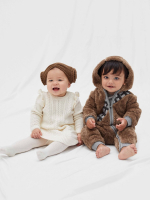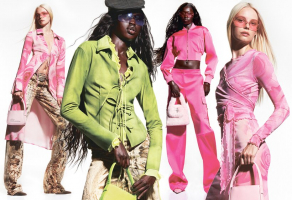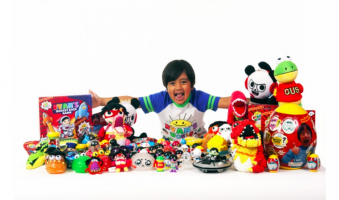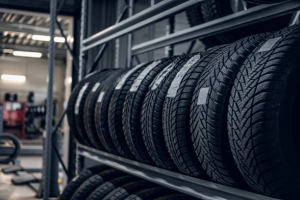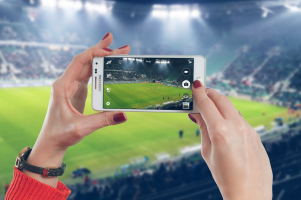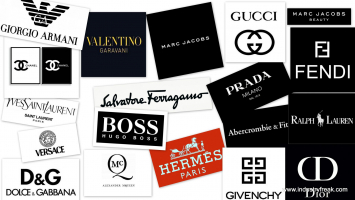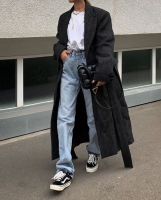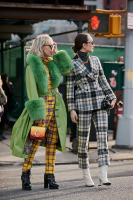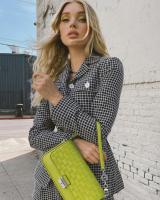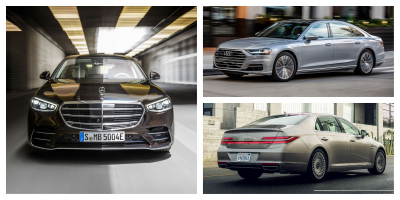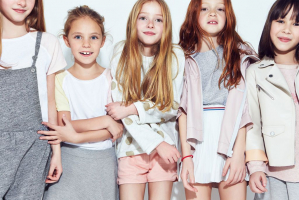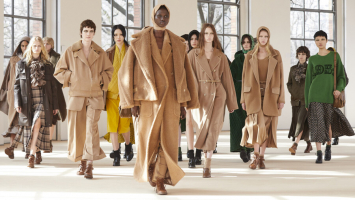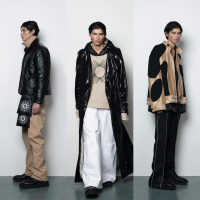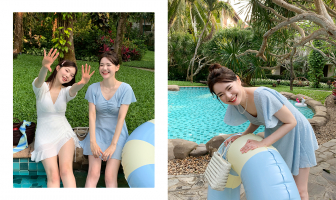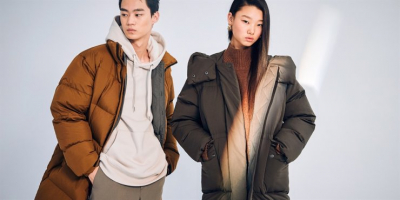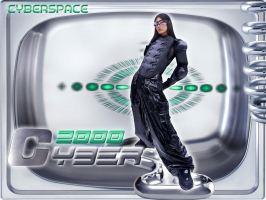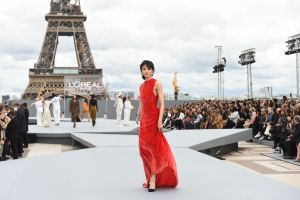Top 8 World's Top Biggest Fashion Brands
Everyone loves a good appearance in their life, and there’s no denying that fashion brands surrounding us make an important contribution on this. They supply ... read more...everything from suits to basic tees and underwear. They help us making our own style and comfort as well as making their designs to the highest of quality. To help you out, we’ve rounded up the biggest fashion brands that you need to know.
-
Nike, Inc. is an American multinational corporation that is engaged in the design, development, manufacturing, and worldwide marketing and sales of footwear, apparel, equipment, accessories, and services. The company is headquartered near Beaverton, Oregon, in the Portland metropolitan area. Many people from all over the world are familiar with the brand.
The company was founded on January 25, 1964 and took its name from Nike, the Greek goddess of victory. The Company's operating segments include North America, Europe, Middle East & Africa (EMEA), Greater China, and Asia Pacific & Latin America (APLA). It also markets products designed for kids, as well as for other athletic and recreational uses such as American football, baseball, cricket, golf, lacrosse, skateboarding, tennis, volleyball, walking, wrestling and other outdoor activities. It sells a line of performance equipment and accessories under the NIKE Brand name, including bags, socks, sports balls, eyewear, timepieces, digital devices, bats, gloves, protective equipment and other equipment designed for sports activities.
The mission of Nike Inc. is to drive product innovation for athletes everywhere. Countless ideas are tested in pursuit of aiding performance, injury risk reduction, enhancing perception and feel, and delivery of innovative products to athletes.
Some outstanding positive points of the brand:
- Footwear is Nike's flagship product. The company manufactures different shoes for a wide variety of sports, such as basketball, football, golf, soccer, baseball, snowboarding, hockey, tennis and volleyball. It also makes consumer fashion shoes such as Mary Janes and flip-flops. Nike shoes are designed for efficient sports performance as well as for aesthetics.
- Apparel - Nike also produces apparel for sports activities, as well as other activities including dance and yoga. It features different collections for its apparel, including Livestrong, Nike Pro, Nike Free and SPARQ. In addition, Nike makes casual clothes for men and women. Many consumers wear Nike clothes not just for sports activities but also for brand status.
- Accessories - The company is also well-known for accessories such as watches, bags and socks, as well as consumer technology such as the Nike+ supplement for the iPod. Nike also sells rubber bracelets, training DVDs and athletic belts. Many of the bags it sells feature a particular team such as Manchester United or a university such as UCLA.
Brand origin: USA
Website: https://www.nike.com/
Revenue: $30,443M (2021), $34,792M (2020)
Photo origin: Google.com
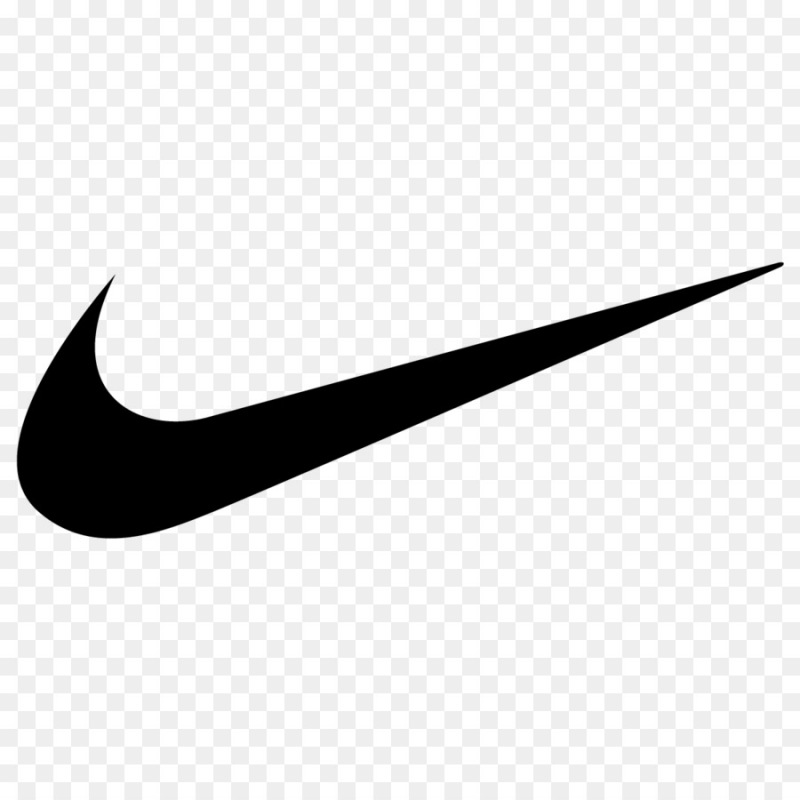
Nike Logo 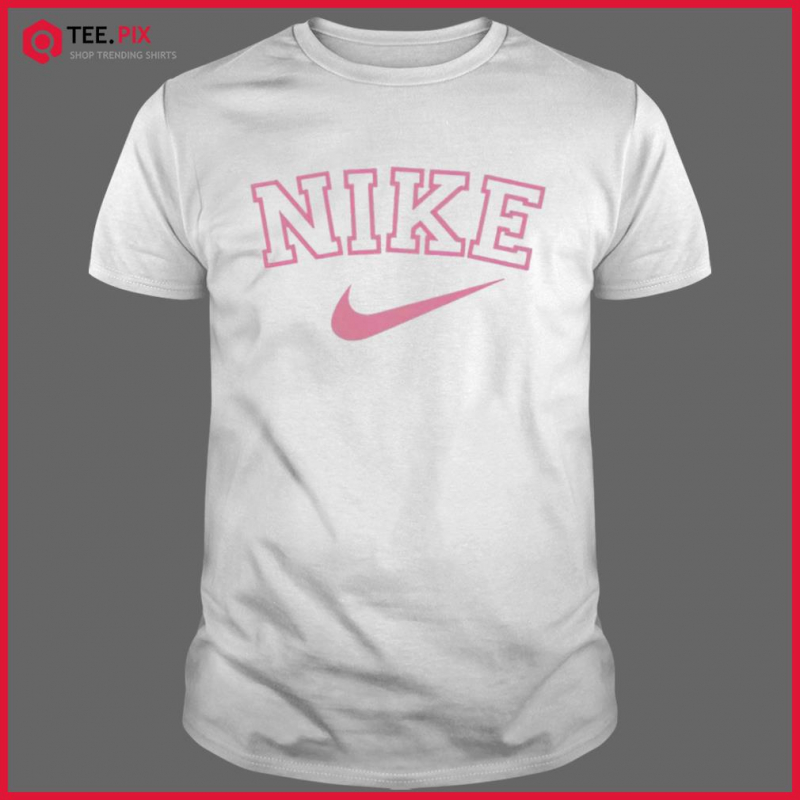
Nike T-shirt -
Gucci, an Italian luxury fashion house based in Florence, Italy was founded in 1921 by Guccio Gucci. Its product lines include handbags, ready-to-wear, footwear, and accessories, makeup, fragrances, and home decoration. Gucci is one of the most renowned and influential luxury brands in the world today, a genuine global reference for fashion and accessories, and a benchmark for a modern, innovative business and has become a worldwide known brand and an icon of the Italian Dolce Vita.
Gucci is striving to redefine Luxury for the 21st century, an ambition that since 2015 has been led by the tandem of the brand’s Creative Director, Alessandro Michele, and its CEO, Marco Bizzarri. Colorful, romantic, poetic and magical, Michele’s unique vision has met with immense critical acclaim while also creating an authentic emotional bond with younger customers. Informed by an erudite interpretation of cultural and fashion history, Michele’s multifaceted approach successfully blends dandyism with the Italian Renaissance, a gothic aesthetic and a DIY punk attitude. Now more than ever, charisma, innovation and a commitment to progress let Gucci take a radically modern approach to fashion.
Some outstanding positive points of the brand:
- Gucci’s strategy to be the hottest brand is to promote inclusivity: appealing to everyone, rather than a specific gender. To that end, the Italian luxury house offers its customers more ready-to-wear to best capitalize on fashion trends.
- Gucci balances its assortment by dividing its offerings: 40% trend-oriented articles and 60% classic styles.
- Gucci is part of the group of brands spearheading sustainable fashion. It would be beneficial for the Italian brand to highlight this effort to boost its image as an eco-conscious company.
- Ecology friendliness. A new Natural Climate Solutions Portfolio is the evolution of Gucci’s commitment from total carbon neutrality to tackle climate change and champion regenerative agriculture. Gucci unveils a climate strategy aimed at protecting and restoring nature. The House is committed to protecting and regenerating critical forests, mangroves and farming landscapes around the globe. Released less than two years after the House rolled out its ground-breaking carbon-neutral plan, its science-led Natural Climate Solutions Portfolio champions supply chain transformation measures, as well as long-term eco-conscious initiatives envisaged around mitigating climate change, creating a positive economic and social impact for local communities and protecting endangered wildlife and their habitats.
Brand origin: Italia
Website: https://www.gucci.com/
Revenue: $15,599M ( 2021), $17,630M (2020)
Photo origin: Google.com
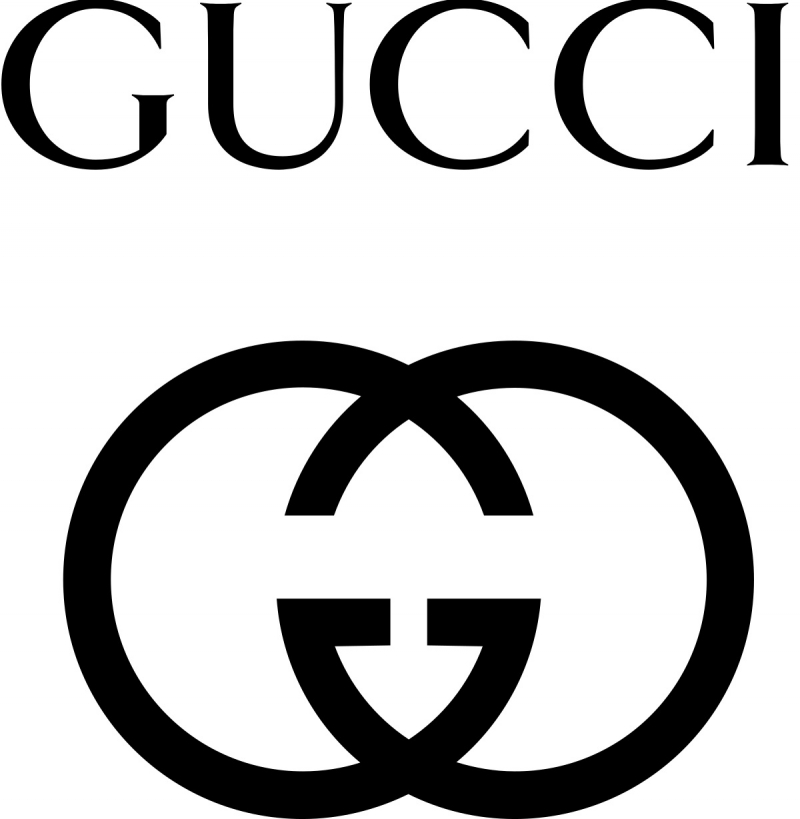
GUCCI Logo 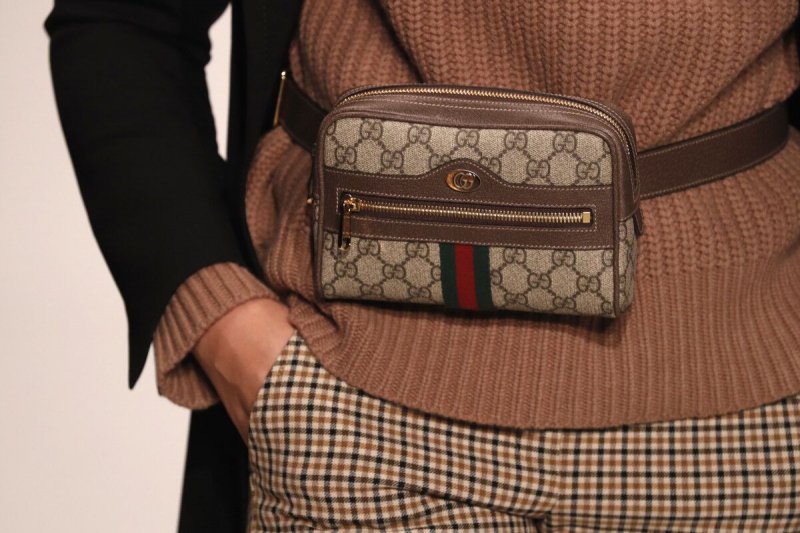
Gucci handbag model -
Louis Vuitton Malletier commonly known as Louis Vuitton or by its initials LV, is a French fashion house and a luxury goods company founded in 1854 by Louis Vuitton. The label's LV monogram appears on most of its products, ranging from luxury trunks and leather goods to ready-to-wear, shoes, watches, jewelry, accessories, sunglasses and books. Louis Vuitton is one of the world's leading international fashion houses. It sells products through standalone boutiques, lease departments in high-end departmental stores, and through the e-commerce section of its website. For six consecutive years (2006–2012), Louis Vuitton was named the world's most valuable luxury brand.
Since the 19th century, Louis Vuitton trunks have been made by hand. Iconic bags of Louis Vuitton include the Speedy bag and Neverfull bags. Each season Louis Vuitton produces rare, limited edition bags that are generally only available by reservation through larger Louis Vuitton stores. Many of the company's products utilize the brown Damier and Monogram Canvas materials, both of which were first used in the late 19th century. All of the company's products exhibit the eponymous LV initials. The company markets its product through its own stores located throughout the world, which allows it to control product quality and pricing. It also allows LV to prevent counterfeit products from entering its distribution channels. In addition, the company distributes its products through the company's own website, LouisVuitton.com.
Louis Vuitton segments the market demographically based on age, sex, and disposable income. Louis Vuitton uses psychographic segmentations such as lifestyle and motives to further identify its target market. For instance, Louis Vuitton targets jet setters, trendsetters, and those who pursue prestige. Louis Vuitton segments consumers by usage; specifically targeting heavy users. Buyer information is collected at the point of sale and stored in a database. Heavy users are sent seasonal catalogs as well as invitations to purchase exclusive product collections to encourage repeat sales and brand loyalty.
Louis Vuitton has been awarded the Butterfly Mark by Positive Luxury for excellence across areas of innovation, social and environmental practices, governance, and philanthropy. Positive Luxury’s mission is to inspire people to buy better and influence brands to do better. The company awards the Butterfly Mark to luxury brands that are committed to sustainability, helping consumers shop with confidence.
Some outstanding positive points of the brand:
- Distinctive, high-end products
- Compete on quality
- Target heavy users
- Market leader in sunglasses
Brand origin: France
Website: https://www.louisvuitton.com/
Revenue: $14,858M (2021), $16,479M (2020)
Photo origin: Google.com
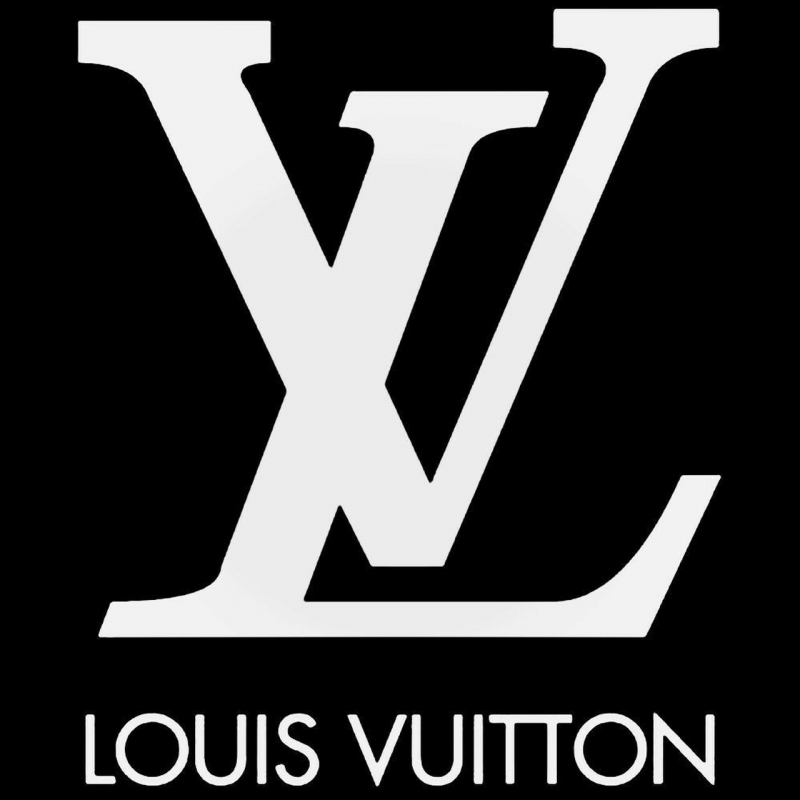
Louis Vuitton Logo 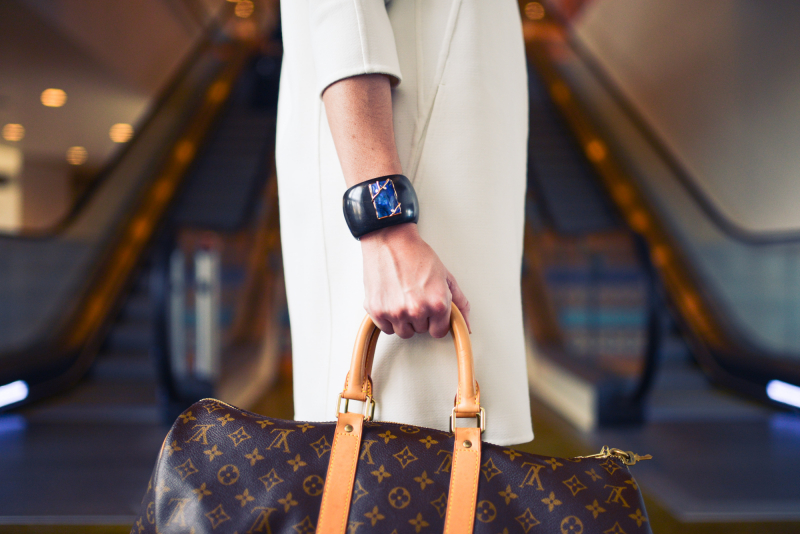
Louis Vuitton Handbag -
Adidas AG is a German multinational corporation, founded and headquartered in Herzogenaurach, Germany, that designs and manufactures shoes, clothing and accessories. It is the largest sportswear manufacturer in Europe, and the second-largest in the world, after Nike. It is the holding company for the Adidas Group, which consists of the Reebok sportswear company, 8.33% of the German football club Bayern München, and Runtastic, an Austrian fitness technology company.
During its operation, the corporation has positive recognition from international institutions and rating agencies, non-governmental organizations (NGOs) and socially responsible investment (SRI) analysts through in-depth analysis of the company’s environmental, social and corporate governance (ESG) programs.
Some outstanding positive points of the brand:
- Operating model: The Adidas brand’s operating model is directed by the guiding principles of Brand Leadership. The aim of Brand Leadership is to provide an organizational structure that enables a ‘consumer-obsessed’ culture that can act with speed, agility and empowerment.
- Consumer centricity: Adidas implemented a global Net Promoter Score (NPS) ecosystem in order to drive brand momentum in a measurable and objective manner. NPS has become an important part of the Adidas brand’s advocacy program. Through this program, they strive to understand consumers’ perceptions (positive and negative) of the brand and the key drivers which motivate them to recommend the brand to their friends.
- Sustainability: The Adidas brand is committed to sustainability and aspires to create lasting change in their industry through eco-innovation, eco-activation, and by scaling its actions to end plastic waste. The brand’s innovations aim to reduce the amount of virgin plastic added to the world and clean up the already existing plastic. As such, the Adidas brand more than doubled the number of products made with recycled ocean plastic from seven million in 2018 to more than 14 million in 2019.
Brand origin: Germany
Website: https://www.adidas.com/
Revenue: $14,342M (2021), $16,481M (2020)
Photo origin: Google.com
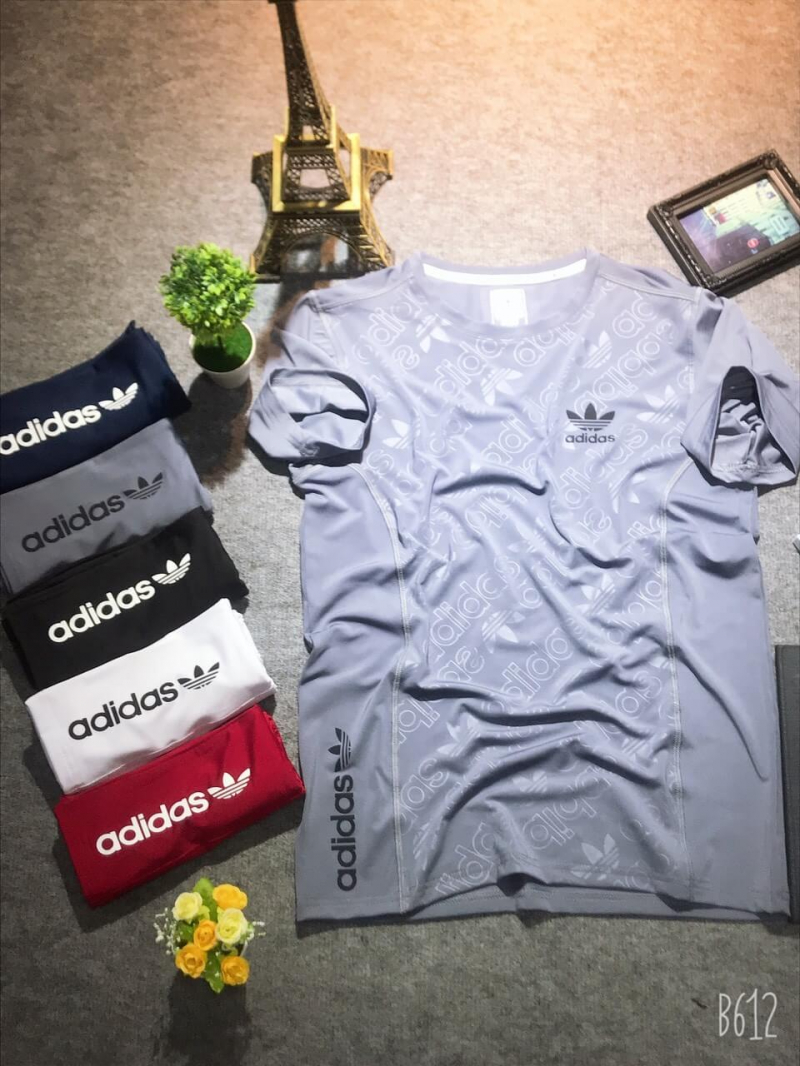
Adidas collection 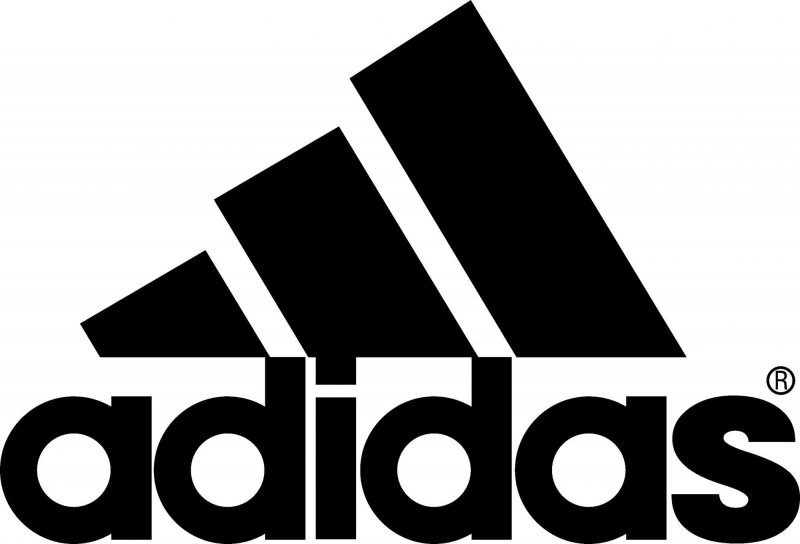
Adidas logo -
Chanel is a French luxury fashion house that was founded by Coco Chanel in 1910. It focuses on women's ready-to-wear clothes, luxury goods and accessories. The company is currently owned by Alain Wertheimer and Gérard Wertheimer, grandsons of Pierre Wertheimer, who was an early business partner of Coco Chanel. Chanel is a very successful luxury brand in the world and the perception of customers toward this brand is relatively higher than its competitors from some aspects.
Chanel has unquestionably made a bold and lasting impression on women’s twentieth-century Haute Couture. From its humble beginnings, set in an early 20th Century Parisian street, the House of Chanel has evolved into one of the world’s leading luxury brands. The combination of historical branding and excellent products explains why Chanel retains its position at the top of the fashion totem. Chanel is labeled as the most popular luxury brand in China. Also, it keeps being ranked as one of the top luxury brands in Forbes.
Chanel is well known for the perfume Chanel No. 5 and the Chanel Suit. Chanel's use of jersey fabric produces garments that are comfortable and affordable. Chanel revolutionized fashion – both high fashion (haute couture) and everyday fashion – by replacing structured silhouettes, based upon the corset and the bodice, with garments that are functional and at the same time flattering to the woman's figure.
Some outstanding positive points of the brand:
- Chanel products are made to high standards;
- They tend to last;
- They involve a degree of craftsmanship;
- Chanel created its unique fashion identity and keep attaining absolute modernity by following the avant-garde artistic work.
Brand origin: France
Website: https://www.chanel.com/
Revenue: $13,240M (2021), $13,705M (2020)
Photo origin: Google.com
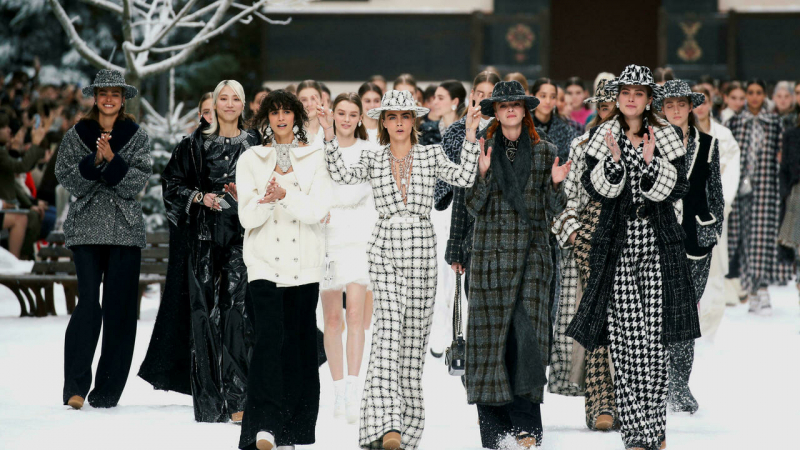
Chanel fashion show 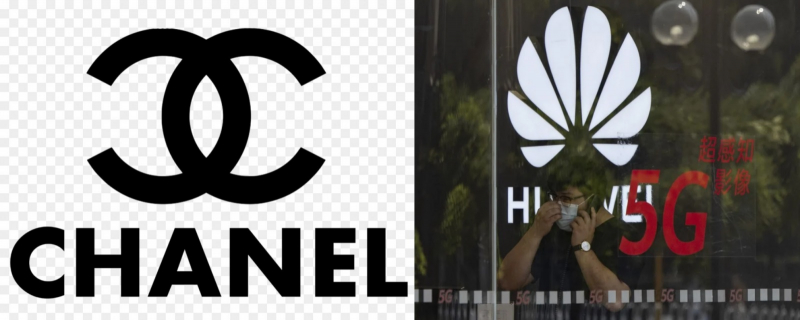
Chanel logo -
Zara SA is a Spanish apparel retailer based in Arteixo, A Coruña, Galicia, Spain. The company specializes in fast fashion, and products include clothing, accessories, shoes, swimwear, beauty, and perfumes. It is the largest company in the Inditex group, the world's largest apparel retailer. The brand was founded by Amancio Ortega in 1975. Zara stores have men's and women's clothing as well as children's clothing (Zara Kids). Zara Home designs are located in European stores.
Zara is famous for its fast fashion. The company can design a new product and have finished goods in its stores in four to five weeks. It can also modify existing items in as little as two weeks. Shortening the product life cycle means greater success in meeting consumer preferences. If a design is not sold well within a week, it will be withdrawn from shops, further orders are canceled and a new design is pursued. Zara monitors customers' fashion changes.
The media often quotes that the brand produces “freshly baked clothes”, which survive fashion trends for less than a month or two. Zara concentrates on three areas to effectively “bake” its fresh fashions:
- Shorter lead times (and more fashionable clothes): Shorter lead times allow Zara to ensure that its stores stock clothes that customers want at that time (e.g. specific spring/ summer or autumn/ winter collections, a recent trend that is catching up, the sudden popularity of an item worn by a celebrity/ socialite/ actor/ actress, the latest collection of a top designer, etc.). While many retailers try to forecast what customers might buy months in the future, Zara moves in step with its customers and offers them what they want to buy at a given point in time.
- Lower quantities (through scarce supply): By reducing the quantity manufactured for a particular style, Zara not only reduces its exposure to any single product but also creates artificial scarcity. Similar to the principle that applies to all fashion items (and more specifically luxury), the lesser the availability, the more desirable an object becomes. Another benefit of producing lower quantities is that if a style does not generate traction and suffers from poor sales, there is not a high volume to be disposed of. Zara only has two time-bound sales a year rather than constant markdowns, and it discounts a very small proportion of its products, approximately half compared to its competitors, which is a very impressive feat.
- More styles: Rather than producing more quantities per style, Zara produces more styles, roughly 12,000 a year. Even if a style sells out very quickly, there are new styles waiting to take up the space. This means more choices and a higher chance of getting it right with the consumer.
Some outstanding positive points of the brand:
- Customer co-creation: Zara’s unrelenting focus on the customer is at the core of the brand’s success and the position it has achieved today
- Super-efficient supply chain: Zara’s highly responsive, vertically integrated supply chain enables the export of garments 24 hours, 365 days of the year, resulting in the shipping of new products to stores twice a week.
- Frequency of customer insights collection: Trend information flows daily into a database at head office, which is used by designers to create new lines and modify existing ones.
- Standardization of product information: Zara warehouses have standardized product information with common definitions, allowing quick and accurate preparation of designs with clear manufacturing instructions.
- Commitment to the environment: Being in a business where it taps on natural resources to create its products, Inditex makes efforts to ensure that the environmental impact of its business complies with UNSDGs.
Brand origin: Spain
Website: https://www.zara.com/
Revenue: $13,156M (2021), $14,582M (2020)
Photo origin: Google.com
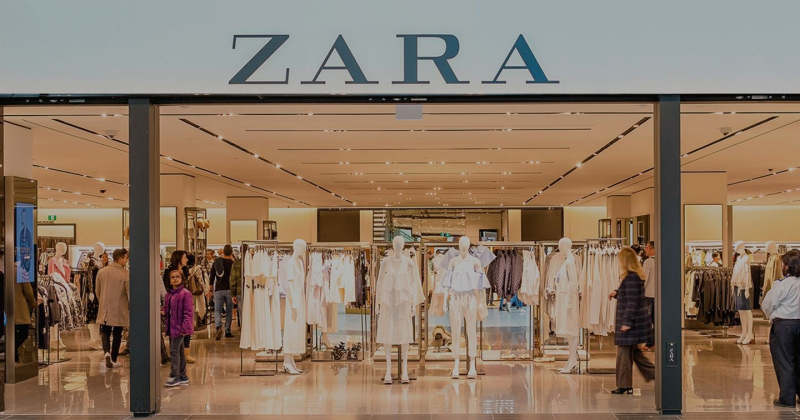
Zara fashion store 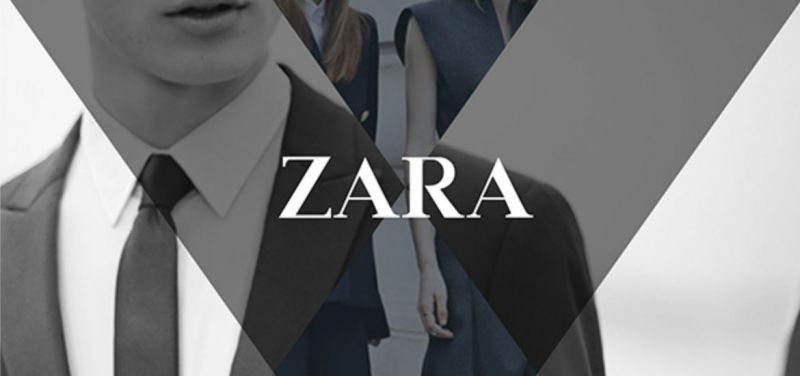
Zara fashion -
UNIQLO is a clothing apparel company, which was originally founded in Yamaguchi, Japan in 1949 as a textiles manufacturer. Now it is a global brand with over 1000 stores around the world major in casual wear designer, manufacturer and retailer.
The brand is famous for its simple style and essential yet universal, so people can freely combine them with their own unique styles, in any way they choose, every day of the year with a belief that everyone can benefit from simple, well-designed clothes. Since its establishment, UNIQLO has continued to aspire towards excellence in quality, design and technology, and has managed to achieve as such. But even so, UNIQLO still strives onwards and upwards, not in pursuit of perfection, but in evolution. UNIQLO is more than just a clothing brand but a way of thinking. Uniqlo aims to be the world’s largest mass clothing retailer, based largely on expansion in the US, China and online.
Some outstanding positive points of the brand:
- Delivery system supporting a clear brand promise: On one hand, Uniqlo has indeed managed to successfully define a clear brand promise for itself to provide high quality, performance-enhanced, universal, basic casual wear at affordable prices. On the other hand, it has also created a strong delivery system to deliver on this brand promise.
- Product development approach and efficient supply chain: The brand’s approach to making apparel has more in common with the iterative approach to product development embraced by the technology industry than the cyclical, trend-driven rhythm of the fast fashion retail industry. Unlike its competitors who sell a large variety of trendy fashion inspired by the global runway, Uniqlo focuses on producing a few styles of urban practical basics.
- Company culture and visionary leadership: Uniqlo’s focus on teamwork is demonstrated through its flat organizational structure with employees greatly encouraged to provide suggestions. The values and goals of the company are translated directly into processes and measures exhibited strongly by employees all over the world.
- High dedication to innovation: One of Uniqlo’s signature innovations is HeatTech, a fabric developed in conjunction with Toray Industries (a Japanese chemical company) that turns moisture into heat and has air pockets in the fabric to retain that heat. The HeatTech fabric is thin, comfortable which has enabled the brand to create stylish designs which are very different from the standard traditional warmth clothing segment.
- Uniqlo brand communication strategy: Until the digital age started to gain rapid global momentum, Uniqlo had traditionally relied on marketing flyers and TV commercials as its primary means of advertising. Today, it uses a plethora of methods to communicate its brand position and ideals, including its unique in-store environment, celebrity brand ambassadors, digital marketing, collaborations with designers and brand campaigns.
Brand origin: Japan
Website: https://www.uniqlo.com/
Revenue: $13,071M (2021), $12,878M (2020)
Photo origin: Google.com
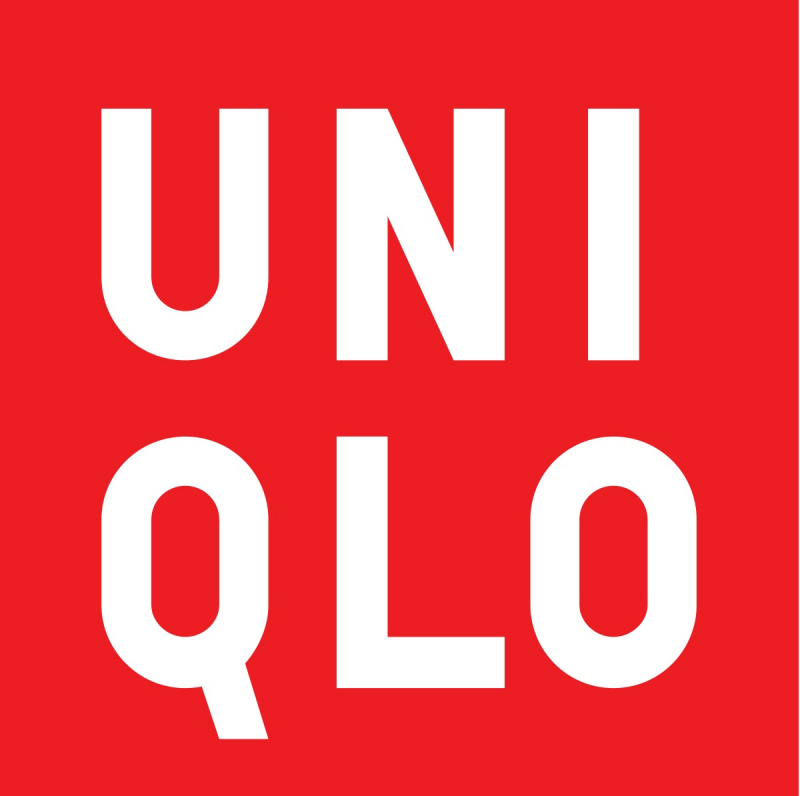
UNIQLO logo 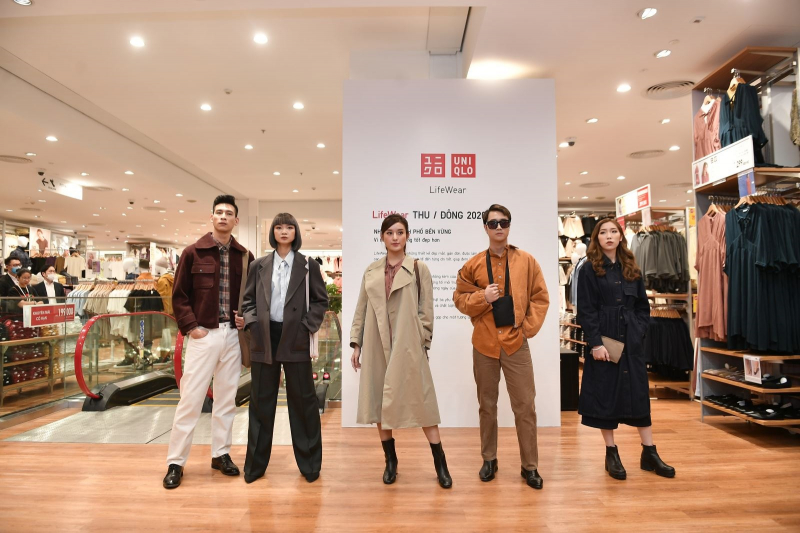
UNIQLO life wear autumn winter fashion models -
H&M is a Swedish multinational clothing company headquartered in Stockholm. It is known for its fast-fashion clothing for men, women, teenagers, and children. The company was founded by Erling Persson in 1947, when he opened his first shop in Västerås, Sweden.
The secret to the success of H&M can be attributed to the fast-fashion business model. Fast fashion relies on moving a large volume of merchandise from the designer table to the showroom floor in the shortest amount of time possible and at a reasonable price. Aimed at young, fashion-conscious urban consumers, their products are trendy and cheap.
Throughout their operation, H&M has achieved many proud awards. H&M Group ranked 11 in Remake’s 2021 Fashion Accountability Report that rates 60 fashion companies according to transparency, climate, diversity and inclusion. In 2021, H&M Group was included in Oxfam Australia’s Naughty or Nice List, which assesses clothing brands on their progress towards paying living wages. Stand Earth ranked H&M Group in the top ten of their Fashion Scorecard 2021 for their performance in deploying fossil-free energy in their supply chain. H&M Group was named one of 37 Global Compact LEADs by the United Nations (UN) in 2021, and other achievements.
H&M's popular brands include H&M, COS, Weekday, Monki, H&M HOME, & Other Stories, ARKET, Afound
- H&M is a fashion brand, offering the latest styles and inspiration for all. With price, quality and sustainability deeply rooted in its DNA, H&M is not only a possibility for everyone to explore their personal style, but it also offers a chance to create a more sustainable fashion future.
- COS first opened on Regent Street, London in 2007, followed by the launch of the online store in 2011. The brand is available across Europe, Asia, North America, the Middle East and Australia, and offers reinvented classics and wardrobe essentials for women, men and children. With items made to last beyond the latest season, the collections merge lasting quality with timeless design.
- Weekday is a Swedish street/fashion brand influenced by youth culture and street style. The brand offers a unique retail experience and a careful mix of women’s, men’s and accessories assortments, as well as a small selection of external brands.
- Monki is a storytelling brand that offers great fashion at competitive prices, aiming to be kind to the world and the people in it. The brand mixes Scandinavian cool with creative street style and is all about being brave, friendly and fun while empowering young women to stand up for themselves — and others.
- H&M HOME is a design-driven global interior brand within H&M Group, offering contemporary decor and home accessories for every style and room. The assortment ranges from high-quality bed linen and timeless dinnerware to stylish textiles, furniture and lamps.
- "& Other Stories" offers a wide range of shoes, bags, accessories, beauty products, stationery and ready-to-wear for women.
- ARKET is a modern-day market offering essential products for men, women, children and the home. ARKET’s mission is to democratize quality through widely accessible, well-made, durable products, designed to be used and loved for a long time.
- Afound offers great discounts on everything, always. The online marketplace (afound.com) and physical stores offer customer discounts on products from all H&M Group brands together with a wide mix of external fashion, sports, interior and beauty brands.
Brand origin: Sweeden
Website: https://hmgroup.com/
Revenue: $12,368M (2021), $13,860M (2020)
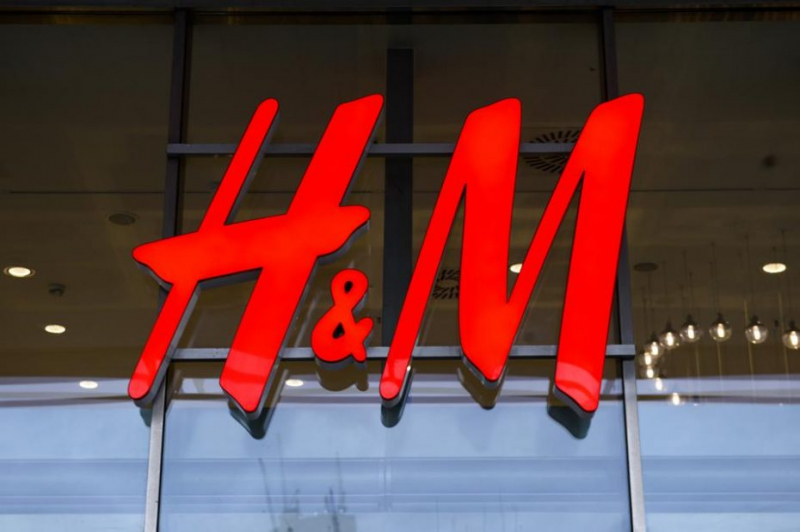
H&M logo 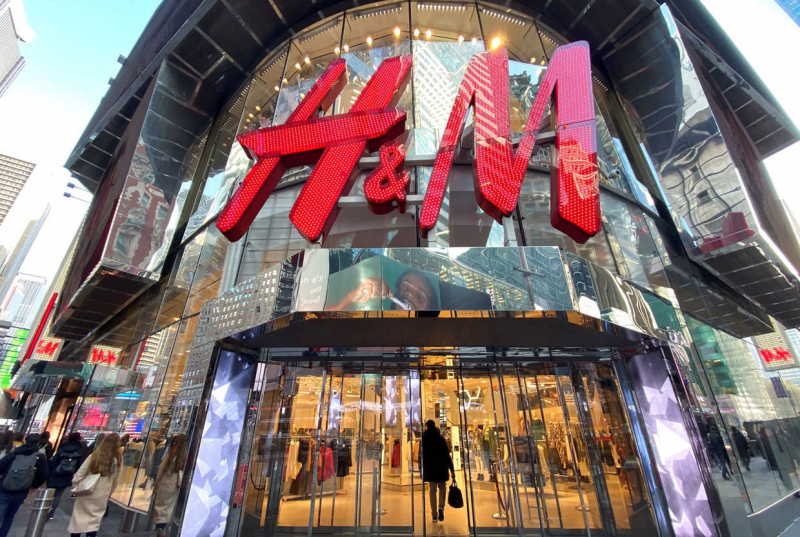
H&M fashion store










